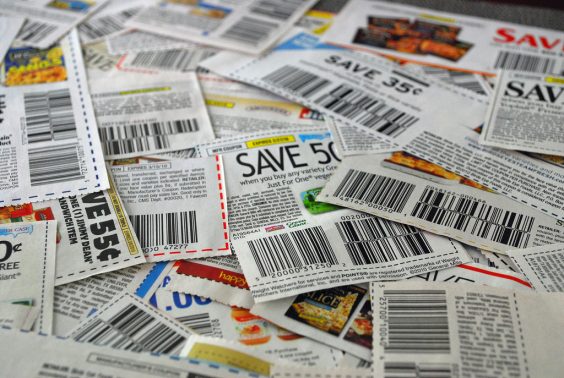
“Void if transferred, reproduced, traded or sold…” You’ve seen the wording in the fine print of your coupons, stating that they are only to be used by their original recipient. Manufacturers have long tried to thwart coupon trading and selling, by printing such restrictions on their coupons. And some couponers have long ignored or defied those terms, by holding coupon swaps and buying and selling coupons online.
But now a new study suggests both sides’ efforts may be misplaced – because retailers and manufacturers actually have the most to gain from coupon trading, while consumers have the most to lose.
That’s according to “Coupon Trading and its Impacts on Consumer Purchase and Firm Profits“, published in the latest edition of the “Journal of Retailing”.
The researchers chose to study coupon trading, which they define as the swapping and/or selling of retail coupons, to determine whom it really helps – and whom it harms. The coupon trade is “an increasingly popular phenomenon,” they write, “which is especially popular on the internet.” And they say it serves an important function.
“Coupon trading reallocates the imperfectly targeted coupons to the ‘right’ consumers,” they argue. Many coupons go to waste, since they reach people who aren’t interested in using them, or in buying the promoted products.
But trading helps to “redistribute coupons to consumers who need them most.” That saves manufacturers the trouble of targeting their offers to select customers – instead, they can send out coupons en masse, and coupon traders will do the targeting for them. “Although firms often consider coupon trading undesirable in the marketplace,” the researchers write, “coupon trading may sometimes increase their profits more than the effortful coupon targeting.”
The study uses complicated mathematical formulas to reach ultimately commonsense conclusions about how the coupon trade affects manufacturers, retailers and consumers. It finds that “coupon trading can increase the profits of either the retailer or the manufacturers, but not at the same time.” Increased use of a lower value coupon will benefit manufacturers, since it will cost them relatively little to move a lot more products. The trading of higher-value coupons, on the other hand, will result in higher demand, more sales and bigger profits for retailers – while manufacturers are left having to fund the coupon campaign.
The most likely result, the researchers find, is that “the manufacturers will increase the wholesale prices to cover the increased costs. This in turn leads the retailer to raise the retail prices.” And couponers who traded or bought coupons in order to save money, end up spending more on everything else because of those increased prices. “In the presence of coupon trading, consumers end up with a higher average cost than in the absence of coupon trading,” the researchers say.
In other words, the study concludes, if you trade, buy or sell coupons – what saves you money now, could end up costing you in the long run.
The study stops short of discouraging consumers from trading coupons. But it does suggest that manufacturers ease up on their prohibitions against the practice. “Firms should allow consumers to trade coupons under certain conditions,” the study reads. “Contrary to the common belief that coupon trading benefits consumers but hurts firms, our results show that it is possible for the retailer and the manufacturers to benefit from coupon trading.”
So does that mean we’ll see less fine print on our coupons soon, with fewer prohibitions against trading, selling and sharing? Not likely. While the terms may seem to suggest that the coupons become void the minute you give a spare one to your grandma, what they really want to discourage is trading, or buying, coupons by the batch. Manufacturers would prefer to have 20 consumers each buy one product with a coupon and possibly buy more later at full price, than to have one person amass 20 coupons and buy 20 items at a discount, and then never buy the product again.
Then again, distributing 20 coupons to 20 people who throw them out and don’t use them, certainly doesn’t accomplish anything. If trading coupons can get them into the hands of people who might actually use them, it could be something manufacturers might reconsider prohibiting in such strong terms. Otherwise, you may well have to watch out, next time you give a coupon to grandma.
Image source: Flickr/ePublicist










